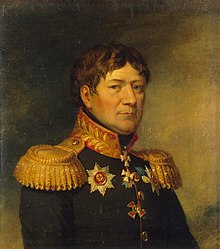Georg Ludwig Pilar from Pilchau
Georg Ludwig Pilar of Pilchau even Egor Maksimovich Pilar of Pilchau ( Russian Егор Максимович Пиллар , born 8 jul. / 19th March 1767 greg. In Kirna , Estonia , † 27 jul. / 8 November 1830 greg. In Märjamaa , Estonia), Lord of Kirna, was a German-Baltic aristocrat . He was in Russian service and achieved the rank of major general .
Life
Origin and family
Georg Ludwig Pilar von Pilchau came from the Baltic noble family of Pilar von Pilchau , whose residence in the Baltic states dates back to 1656 . His parents were Major Magnus Wilhelm Pilar von Pilchau ( Russian Магнус Вильгельм Бар. Пилляр фон Пильхау , * 1734; † November 25, 1801 in Jöggis ), Lord of Kirna, and Catharina Helena von Tausas (1735-1791). Georg Ludwig was married to Johanna Agneta von Hesse (1779–1847), their three sons were:
- Alexander Pilar von Pilchau (1804–1866) Staff Captain
- Nikolai Pilar von Pilchau (1815–1887), lieutenant
- Georg Jakob Baron Pilar von Pilchau (* December 18, 1819, † July 16, 1882), staff captain, this was married to Sophie Julie Agnes Clapier de Colongue (1835-1911).
- Maximilian Pilar von Pilchau (1860–1917), with him the Kirna branch died out in the male line in 1917 .
Career
Georg Ludwig began his military career in 1780 as an ensign , during which he completed several officer courses. In the active military service he was taken in 1784 and served as a lieutenant in Narva in infantry - regiment . His next assignment was in the Vyborg Infantry Regiment, with this regiment he was used for his first war missions. In 1788 he took part in the Russo-Swedish War (1788-1790) and in 1790 was promoted to captain . After the war he continued to serve in the Imperial Russian Army and was promoted to major in 1798 . His next war employment followed in the Napoleonic War , he was deployed in 1799 under Suworow in Austria , northern Italy and 1800 under Korsakow in Switzerland . In 1801 he returned to Russia as a lieutenant colonel and was promoted to colonel in 1805 . Other war missions were in the Battle of Austerlitz , the Battle of Preussisch Eylau and the Battle of the Passarge River in Poland . After further missions in Sweden he took part in the Russo-Turkish War (1806-1812) and fought between 1808 and 1809 in Moldova and Wallachai . In recognition of his services, he was appointed brigade commander and on October 19, 1810 took command of the Jäger Brigade of the 4th Infantry Division.
In 1812 he was a participant in the Patriotic War and led his brigade as part of the 2nd Infantry Corps (General Baggowut) in the 1st Western Army. He took part in the battles near Vitebsk , Smolensk , Valutina Gora and the Battle of Borodino (September 7th). His forces fought off several French attacks in the center of the position before being withdrawn that evening. In the Russian counterattacks he took part in the battle of Tarutino , Vyazma and Krasnoye . For his services he was promoted to major general on November 21, 1812 (rank since August 26, 1812).
In the campaign of 1813 his Jägerbrigade fought in the battles of Großgörschen and Bautzen (Order of St. George 3rd class) and in the battles of Lebau, Großkirchen and Nieder-Putzkau. He then took over the leadership of the 17th Infantry Division in the 8th Infantry Corps and intervened under General de Saint-Priest in the decisive battle of Leipzig . The "special unit" then commanded the occupation of the city of Andernach. In the campaign of 1814 he took part in the siege of Mainz and then advanced as a commander of allied troops (e.g. Sweden) via Reims to Paris . On March 18, 1814, his troops were in the Vincennes area and later took part in the assault on Montmartre . For his achievement he was awarded the Order of St. Vladimir 2nd Class and the Prussian Order of the Red Eagle 2nd Class. By a supreme order of July 22nd, 1817, Major General Pilar was appointed commander of the 1st Brigade of the 16th Infantry Division. For health reasons he was released from the Imperial Russian Army in August 1817 and lived on his estate in Kirna until his death .
Orders and decorations
- Order of St. Vladimir (2nd class)
- Russian Order of Saint George (3rd and 4th grade)
- Russian Order of Saint Anne (1st class and 2nd class with diamonds)
- Prussian Red Eagle Order (2nd class)
- Military order Pour le Mérite
- Swedish Order of the Sword
- Golden sword for bravery, once with a silver medal and once with diamonds
- Order of St. Andrew the First Called
literature
- Otto Magnus von Stackelberg (edit.): Genealogical handbook of the Baltic knighthoods part 2, 1.2: Estonia, Görlitz 1930, p. 157.
Web links
- Marat Gainullin, quotations from the book "Balts in the Patriotic War of 1812", Tallin, 2001 , pages 438–442, (Russian)
- Eesti Päevalehe laupäevaleht , No. 5, November 10, 2012, page 33
| personal data | |
|---|---|
| SURNAME | Pilar von Pilchau, Georg Ludwig |
| ALTERNATIVE NAMES | Pilar von Pilchau, Egor Maksimowitsch; Пиллар, Егор Максимович (Russian) |
| BRIEF DESCRIPTION | German-Baltic nobleman |
| DATE OF BIRTH | March 19, 1767 |
| PLACE OF BIRTH | Kirna , Estonia |
| DATE OF DEATH | November 8, 1830 |
| Place of death | Märjamaa , Estonia |

